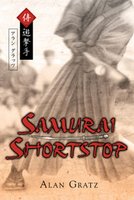
According to legend, I had an ancestor of some sort who played professional ice hockey back in Canuckistan. He died young, however, under mysterious circumstances, and we Gauthiers learned our lesson. To my knowledge, no one in my family has been involved with a team sport past the kiddie leagues since that time. We had two competitive high school wrestlers and three martial arts students, two of whom made black belt level, suggesting that while we're not team players, we're very scrappy. But I don't have many relatives who even watch sports on TV, and if anyone knows what the heck the Super Bowl is about it's because he or she married into the family.
My point is that I can't help my lack of interest in baseball. I totally don't understand the romance of the game or why it has cult status. Putting the word "shortstop" in the title of a book is not going to be a draw for me. The word "samurai," on the other hand, might pique my interest.
And thus I recently finished reading the really fine historical novel Samurai Shortstop by Alan Gratz. I knew I wasn't going to be killing time reading a cookie cutter teen novel after I finished the first chapter, in which the main character's uncle commits ritual suicide and his father indicates that he'll be following him sometime soon.
Samurai Shortstop is a historical novel that is as strong on novel as it is on history. Gratz has a good story and well-developed characters to go along with his research. To me, this is what a historical novel should be.
One of the things that I think makes the book so good is that it deals with culture clash. According to the Author's Notes at the end of the book, Japan didn't open up to Western culture until the 1850's. By 1890, the time in which Samurai Shortstop takes place, the old Japanese ways were being displaced by all things western. Among those things was baseball.
Will young American readers get the zenny aspects of this book and "the way of the warrior?" Or will they find old Japanese culture too remote to be of interest to them? I don't think so because a great deal of what's going on in Samurai Shortstop deals with school life. Even though we're talking about a boarding school with a code of behavior unheard of in our time, it's still school. I also think young people understand the attraction of the new, and the young people in Samurai Shortstop are seriously attracted to the new sport of baseball.
At the same time, though, there is no doubt that these young people are from another time.
By the way, did any other readers catch the references to the original Iron Chef? In a chapter in which the Ichiko students have to start running their dining room's kitchen themselves, one character, while talking about miso soup (an Iron Chef staple), says, "If memory serves--" Every episode of Iron Chef opens with the Chairman using that phrase. Later, another character says, "Allez cuisine!" Again, a favorite expression of the Chairman's.
The Author's Notes I mentioned before are excellent, and Gratz includes a list of sources.
2 comments:
I would be interested to know what you thought about the time frame of this book. I really liked the setting, and the cultural information it provided, but I thought it telescoped the protagonist's learning process into far too short a time period.
I also thought that the school, as presented, would not have permitted the father to alter the son's schedule so radically.
But that being said, I really did enjoy the book.
I wondered about the school allowing the father to teach the son bushido, too. If the samurai had been outlawed, wouldn't instruction in their martial art also be outlawed?
As far as telescoping the protagonist's learning process, I didn't think about it at the time. If anything, I thought the new students became comfortable at the school awfully fast.
Post a Comment